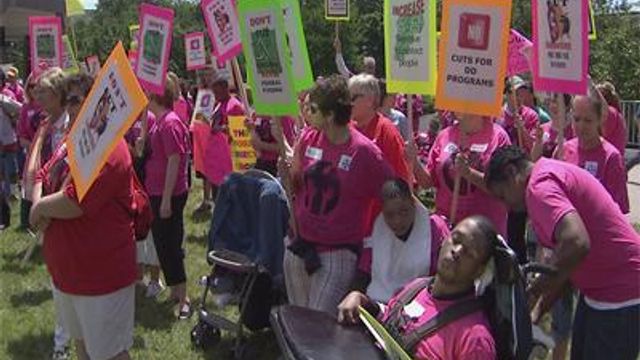Local News
Advocates: Budget cuts would be devastating for mental health
The state budget for the 2009-10 fiscal year could be cut by up to $1.4 billion in that area because of the struggling economy. Hundreds of millions in funding for mental health and developmental disabilities are at risk.
Posted — UpdatedRALEIGH, N.C. — More than 1,500 patients, family members and providers gathered outside the General Assembly Wednesday to let state legislators know the impact cutting funding for health and human services could have on patients.
The state budget for the 2009-10 fiscal year could be cut by up to $1.4 billion in that area because of the struggling economy. Hundreds of millions in funding for mental health and developmental disabilities are at risk.
Mental health advocates said that would devastate thousands of lives.
"We hope to be able to show legislators today that these are real people that will be impacted by potentially devastating – in some cases, quite honestly, maybe life-losing – cuts," said John Tote, executive director of the Mental Health Association of North Carolina.
In past years, advocates said, they have focused on opportunities to improve patient care and ways to move North Carolina forward in that area. This year, they said, it's about survival.
David Taylor, 25, was born severely disabled, but with daily assistance he has been able to live on his own for seven years and obtain a job in data entry with Richard Petty Motorsports
"I live every day in fear that he'll lose his services and end up in an institution, and he's too independent and too able-bodied for that," his mother, Judy Taylor said.
"He goes to the grocery store, movies, ball games. He's involved in the community, Civitan and church," she added. "He lives a life like everyone else, but if he loses his services, it cuts everything out."
For John Owen, who has been diagnosed with bipolar disorder and other mental illnesses, budget cuts might result in cheaper medications, which he said, have much worse side effects.
"Years ago, if I became noncompliant on meds, I'd probably find myself in a state hospital, where the conditions can be quite abusive."
The domino effect, Tote said, could result in more jail time, homelessness and loss of life.
"It's been a long road to get (where we are now,)" Judy Taylor said. "You don't want to give it up."
• Credits
Copyright 2024 by Capitol Broadcasting Company. All rights reserved. This material may not be published, broadcast, rewritten or redistributed.





